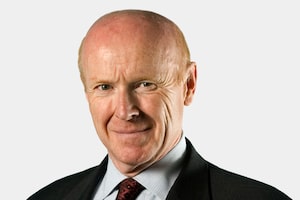Dan Richards is president of Strategic Imperatives. He is a faculty member in the MBA program at the Rotman School at the University of Toronto. He also hosts a weekly conference call called Monday Morning Jump Start, which is about strategies for financial advisors. Advisors can see it GlobeAdvisor.com. He can be reached at richards@getkeepclients.com
After last year's market meltdown, many investors are revisiting what they're looking for in their financial adviser.
A few years back, I appeared on a business television show with host Kevin O'Leary of Dragons' Den fame. Mr. O'Leary launched into a diatribe against useless financial advisers. I said I agreed with him, there were some advisers who shouldn't be in the business. I went on to say that you can divide any profession into three categories. There are perhaps 25 per cent at the top who are outstanding, regrettably always a few at the bottom who are dreadful and the rest who fall somewhere in between. That's true of doctors, lawyers, teachers - and even journalists.
As a result of the past year's market developments, some investors are rethinking the adviser they work with - or whether they want to work with a financial adviser at all. When it comes to advisers, investors need to make two decisions - who you want to work with and how you want to work with them.
The right adviser
In my experience, most investors would benefit from working with a solid financial adviser, with two stipulations.
First, you have to be genuinely open to advice - some investors are so set in their views that it's impossible for an adviser to add value.
And second, the adviser has to be the right fit for you. I've spent a lot of time over the past 20 years working with advisers - some added a great deal of value to clients, some added modest value and a few added no value.
For advisers who add little value, it's almost never because they aren't concerned about their clients' well-being - the vast majority of advisers care deeply about the people they work with. Sometimes, the problem stems from lack of discipline - advisers allow themselves to be caught up in the same emotional maelstrom that investors fall victim to.
In other instances, advisers lack the commitment to dig deep to find the best investment solutions. Other times, they fail to hire staff sufficient to keep up with the growth of their business, and client communication and service levels suffer as a result. Finally sometimes, they simply aren't tough enough with clients.
I recently had lunch with a friend from Vancouver who had lost 40 pounds since January. When I asked him the secret, he said: "Simple. In January, I went in for my annual physical. At the end, my doctor said: 'Jim, each of the last four years I've told you that you need to lose weight. If you haven't lost weight by next January, don't come back.' "
Good advisers are prepared to take this same kind of tough love approach. Whether it applies to realistic spending and saving levels, staying the course in tough markets or the risk needed to achieve your long-term goals, sometimes advisers need to have candid conversations with clients, even if clients leave as a result.
The right relationship
Let's suppose you've identified an outstanding adviser - smart, disciplined, professional and a good communicator.
Next, you have to be sure you're on the same page when it comes to how you want to work. Not that long ago, most client-adviser relationships were driven by the adviser - the adviser would make a recommendation and the client would respond, "If that's what you think, fine let's go ahead." In truth, this was not fundamentally different than the generally deferential attitude to authority that marked relationships with other professionals, like doctors.
All of that changed with the skepticism that marks baby boomers and the Internet's levelling of the information playing field. Talk to any doctor and she'll tell you about patients coming in with articles they've pulled off the Web and lists of questions. Advisers face the same, as investors are asking tougher questions and many want to be equal partners in the decision-making on their portfolios.
Not every investor is looking for this level of involvement; some don't have the interest, the knowledge or the time and are happy with a more traditional relationship, in which advisers bear the bulk of the responsibility for initiating recommendations. Further, just as not all doctors are keen about the questions that come from more informed patients, not every adviser welcomes a more engaged client.
There is no one way for advisers and investors to work - just the relationship that is right for each individual investor. A key discussion point for investors and advisers contemplating the possibility of working together is to discuss what each of you is looking for in the dynamics of the relationship. Only by having that conversation will the odds of a successful long-term relationship be tilted in your favour.
 Dan Richards
Dan Richards